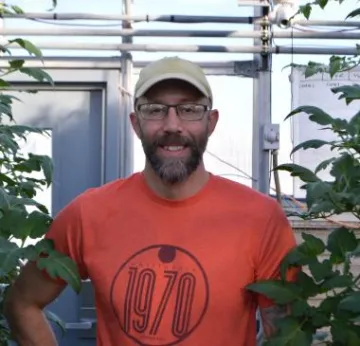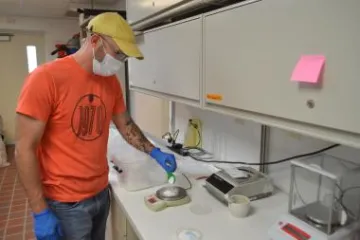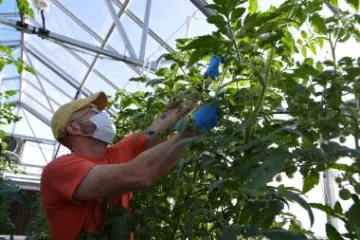Meet Joe Alcorn.

Originally from Peoria, Illinois, Joe came to the University of Arizona’s Controlled Environment Agriculture Center in the fall of 2018 with an extended background in the CEA field. Back in 2000, he started growing hydroponically as a hobby. Since then, he’s gained years of experience in the industry working for manufacturers, wholesale distributors, retailers, and as a grower himself. He also obtained a B.S. in Plant from Soil Science from Southern Illinois University.
“CEA was the only means to produce the products that I was interested in growing with consistent quality and quantity,” Joe said.“ I just fell in love with providing optimum environments for plants and seeing them respond.”
Joe decided to take the next step in his career and pursue a master's degree here at the University of Arizona. He is currently in his second year in the Applied Biosciences, Professional Science Masters program, on the Controlled Environment Agriculture track.
“Before this program, I didn't collect a lot of data in my growing,” Joe said. “This is a very science and data-driven program and I love seeing charts, graphs, and trends of our data. It's such an important part of growing and such a beneficial tool.”

With the mentoring of Dr. Gene Giacomelli, Joe is currently working on a two-year portion of a four-year National Science Foundation grant study that is focused on analyzing plant growth at air temperatures that are higher than normal. The study is designed to be a part of a larger system to treat agricultural irrigation run-off from field production through thermo-desalination in a greenhouse.
Since the start of his program, Joe has been working diligently on this project in one of UA-CEAC’s many research greenhouses gaining much practical production experience.
Our research greenhouses are covered with double-layer acrylic and are equipped with Wadsworth EnviroStep control systems, pad and fan-based mechanical cooling, and natural gas-based unit heating systems—something Joe has to monitor every day. In the particular greenhouse Joe is conducting his research, he is working with the recirculating hydroponic system and a deep water culture system he constructed.
The data that Joe is collecting focuses on the many environmental parameters that are needed to evaluate what the plants are experiencing and their responses. Joe measures variables such as water consumption, soil water content, temperature, humidity, and net radiation to give him an indication of the stress conditions [or not] that the plants are experiencing in this environment. The crops that he is growing in this environment include cherry tomatoes, truss tomatoes, cucumbers, and melons. He is also growing lettuce and basil in the deep flow hydroponic system.

"I think the challenge beyond keeping all the equipment functioning is figuring out how to find significance in the data," Joe describes when asked what challenges him the most in his research. "For example, can I correlate substrate water content with lysimeter data? Can I correlate misting system run time with leaf temperature? We have so much data it takes some figuring to find the significance."
However, Joe says his favorite aspect of his research process is applying the theories he has learned toward the operational decisions and systems designs.
“Dr. Gene Giacomelli is fostering my growth by holding open discussions about design ideas which boosts my confidence as a grower,” Joe said. “This ultimately applies to our experimental design and it is really neat to see our ideas work.”
With this research, Joe’s ultimate goal is to understand how to minimize stresses on plants and promote ideal growth in non-ideal growing conditions. He also says he wants to understand how to influence quality and quantity when growing in these types of greenhouse conditions.
After he graduates, Joe hopes that he will be able to apply the most current theories about plant science and plant manipulation in real-world scenarios.
Read more of our Student Spotlights by clicking here.

